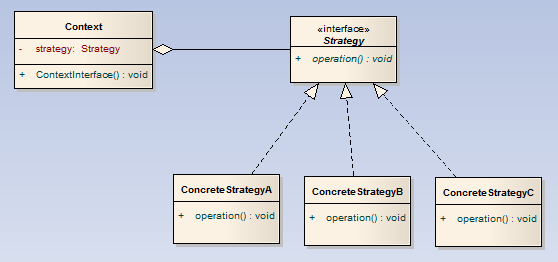设计模式之策略模式
1 概述
策略模式(Strategy Patern),是把针对同一件事情的不同的算法分别封装起来,并且相互之间可以替换。这种模式的使用需要以下三种角色:
(1)环境角色:应用不同的策略来达到完成某件事情的目的;
(2)抽象策略角色:通常由接口或者抽象类实现,所有的具体角色都继承此抽象;
(3)具体策略角色:具体的算法实现;
2 示例
相对来说,例子还是挺多的,比如淘宝搜索的时候,是按照卖出量排序还是价格排序还是好评度排序等等。
前面的几种模式都是拿手机做例子,那还是继续手机做例子吧。
现在的智能手机基本上都是大屏幕,看着花里胡哨的很爽。流行的手机操作系统都支持换屏幕主题的功能。不同的Theme有着不同的背景图、图标、字体。用户还能自定义特殊癖好的主题。
首先来个接口,所有的手机主题都必须实现此接口:
1 package org.scott.strategy; 2 /** 3 * @author Scott 4 * @date 2013年12月22日 5 * @description 6 */ 7 public interface Theme { 8 public void backGround(); 9 public void fontStyle(); 10 public void smsRing(); 11 }
接口中定义了三个方法,分别是背景图片、字体类型、通知铃声。有了抽象策略角色,下面就实现两个具体的主题策略:
1 package org.scott.strategy; 2 /** 3 * @author Scott 4 * @date 2013年12月22日 5 * @description 6 */ 7 public class ClassficTheme implements Theme { 8 9 @Override 10 public void backGround() { 11 System.out.println("Back ground image is: 水墨中国.jpeg."); 12 } 13 14 @Override 15 public void fontStyle() { 16 System.out.println("Font style is: 正楷."); 17 } 18 19 @Override 20 public void smsRing() { 21 System.out.println("The sms ring is: 春江花月夜"); 22 } 23 24 }
再来个现代风格的主题:
1 package org.scott.strategy; 2 /** 3 * @author Scott 4 * @date 2013年12月22日 5 * @description 6 */ 7 public class ModernTheme implements Theme { 8 9 @Override 10 public void backGround() { 11 System.out.println("Back ground image is: 奇幻星空.jpeg."); 12 } 13 14 @Override 15 public void fontStyle() { 16 System.out.println("Font style is: 静蕾体."); 17 } 18 19 @Override 20 public void smsRing() { 21 System.out.println("The sms ring is: Nohthing In The World."); 22 } 23 24 }
有了抽象策略和具体策略,还差个Context角色:
1 package org.scott.strategy; 2 /** 3 * @author Scott 4 * @date 2013年12月22日 5 * @description 6 */ 7 public class Context { 8 private Theme theme; 9 10 public void setTheme(Theme theme) { 11 this.theme = theme; 12 } 13 14 public void getTheme(){ 15 theme.backGround(); 16 theme.fontStyle(); 17 theme.smsRing(); 18 } 19 }
我们来个手机设定个Theme吧,看看我们的客户端代码:
1 package org.scott.strategy; 2 /** 3 * @author Scott 4 * @date 2013年12月22日 5 * @description 6 */ 7 public class StrategyClient { 8 9 public static void main(String[] args) { 10 Context theme = new Context(); 11 theme.setTheme(new ClassficTheme()); 12 theme.getTheme(); 13 } 14 }
执行结果呢?
Back ground image is: 水墨中国.jpeg.
Font style is: 正楷.
The sms ring is: 春江花月夜
3 小结
策略模式一个很大的特点就是各个策略算法的平等性。对于一系列具体的策略算法,大家的地位是完全一样的,正因为这个平等性,才能实现算法之间可以相互替换。所有的策略算法在实现上也是相互独立的,相互之间没有依赖。
并且,在运行期间,策略模式在每一个时刻只能使用一个具体的策略实现对象,虽然可以动态地在不同的策略实现中切换,但是同时只能使用一个。就像我们的例子,只能使用一个主题,这个可以理解,你只有一个手机,一个屏幕~
最后上个经典的类图吧(源自网络):
